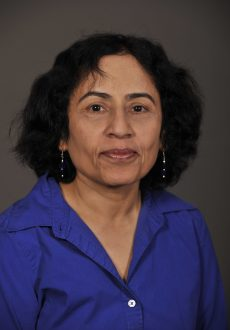The Department of Communication Sciences and Disorders and the University Speech and Hearing Clinic have come together to host hearing loss support group sessions. Initiated by department chair Vishakha Rawool, the “Succeed with Hearing Loss” support group sessions include six graduate students leading a group of five participants from the Oxford community.
The graduate students discuss different topics in the sessions, from communication strategies to what to do in an emergency situation. They also discuss different options for alarms and assisted listening devices, such as hearing aids. Any participant can get a hearing aid fitted during a session.

Vishakha Rawool, Chair of Department of Communication Sciences and Disorders. Rebecca Lowe, Co-Director of Speech and Hearing Clinic. Photo courtesy: The University of Mississippi Department of Communication Sciences & Disorders
Group participant Brenda Weeks said she was amazed at the technology accessible to help with her hearing loss. When using some of the technology at a meeting, Weeks said she felt like she could hear for the first time.
“I could hear. Everything was awesome. I could hear plainly what (one of the graduate students) was saying,” Weeks said.
Weeks said that her favorite part of the group has been how honest and open it is. She said she feels that she is not alone when she attends.
“I am a firm believer in education, and I have learned so much about hearing loss,” Weeks said. “That has been the ‘ah-ha’ moment.”
While this semester’s participants are all older than 50 years old, the group takes participants from any age level. The group meets every other Friday from 1 to 3 p.m. in the J.D. Williams Library.
Participants are encouraged to bring partners, family members and their children to be a part of the sessions. Caroline Kidder, a communication sciences and disorders graduate student, said the sessions resonate with her on a personal level.
“My father has hearing loss, and I helped him through the process of getting a hearing aid and adjusting to using it,” Kidder said. “Since then, I have been interested in helping other people with hearing loss as well as the people that communicate with people with hearing loss. I can relate with what they are going through.”
Rebecca Lowe, co-director of the Speech and Hearing Clinic, said there are many ways for an individual with hearing loss to deal with a difficult situation.
“The strategies may be (helpful) when you go to a noisy restaurant, and you realize you are not going to be able to hear your family talking at the table. Advocate for yourself,” Lowe said. “Ask for the table in the corner and then position yourself so that the walls are behind you and you don’t have a lot of background noise behind you.”
The graduate students also encourage participants to ask people to speak more slowly, to watch the person’s face when they speak and to have a cue to remind the individual to speak up.
“(The participants) come back each week and talk about how they implemented that communication strategy and what they did well that week and what difficult listening situations they had,” Lowe said.

Rebecca Lowe, Co-Director of Speech and Hearing Clinic. Photo courtesy: The University of Mississippi Department of Communication Sciences & Disorders
The program also teaches that emotions also play into hearing loss — hearing loss can be linked to frustration and depression due to the feelings of social isolation it can cause. Lowe said the support group helps participants realize that they are not alone.
“This one man was talking about how, after he has a group meeting at work, he is just so exhausted because he is trying to listen so intently to every person talking,” Lowe said. “And then another participant spoke up and said, ‘I thought I was the only one who was tired, and I don’t even want to be around people on the weekend because it is just so tiring. I didn’t know that this was normal.’”






